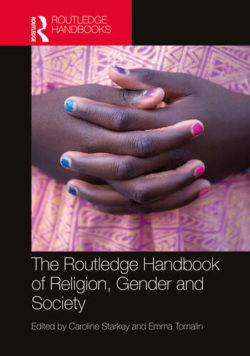Q&A with Caroline Starkey and Emma Tomalin: The Routledge Handbook of Religion, Gender and Society
In this post, we speak to Dr Caroline Starkey and Professor Emma Tomalin about the exciting release of their new book 'The Routeledge Handbook of Religion, Gender and Society'. Routeledge: https://www.routledge.com/The-Routledge-Handbook-of-Religion-Gender-and-Society/Starkey-Tomalin/p/book/9781032161402

How has this book come about?
A few years ago, Emma completed a very successful Routledge Handbook of Religions and Global Development, and she enjoyed the process of putting it together, editing and publishing cutting edge work in the handbook format. Emma was approached by Routledge to see if she would be interested in putting another Handbook together, but this time about Religion and Gender. It’s quite a substantial job to bring together excellent scholars from all corners of the globe, sourcing and editing their work, so Emma and Caroline decided to work on it together. Emma was Caroline’s PhD supervisor and they have collaborated on several different research and writing projects over the years. Working together has always been fun and very rewarding and we bring complementary skills to the table.
From the start of the process of putting the Handbook together, we were keen to do something a little different. We wanted ‘gender’ not just to be a proxy for women (and the need to include ideas of men and masculinity, as well as beyond that binary). We wanted to incorporate scholarship written from across the world and from within varied contexts, blending work from those well-known in the academy with emerging scholars, some still in the process of completing PhDs. We also wanted to balance context-specific focus, with broader theoretical and methodological questions and framings, both working together to advance the conversation about religion and gender. The process of identifying what scholarship we wanted to feature was a careful and well-thought out one. We spent a long time trawling through speakers lists from conferences and websites, sending many emails and making informal enquiries, coupled with a more formal call for contributions. We asked colleagues to recommend people, and our list of contributors snowballed. We responded carefully to feedback from reviewers who looked at our initial proposal, and we kept building the Handbook contents until we had 40 fantastic contributors, plus our own introduction.
What is/are the key argument(s) that the book develops?
The Handbook doesn’t simply put forward one argument, it is a collection of 41 chapters (including an introduction) articulating many multi-faceted arguments and approaches to the study of religion, gender and society. In such a complex topic there cannot be one sole argument, but multiple ways to explore, articulate, question and envisage relationships and situations. Quoting from our introduction, what we aimed to highlight throughout the Handbook was:
“...the enduring role of religion in shaping attitudes and behaviours with respect to gender roles, identities and relationships in ways that have an impact upon people’s ability to participate in the activities of their religious traditions fully and equally, as well as their opportunities and status within their local communities and wider societies” (Tomalin and Starkey, 2022: 1).
Although each of our authors was writing from a very different context or perspective, there are common themes that help to structure the Handbook and that run through each chapter as questions to consider. For example, expectations of behaviour and the normalisation of women’s inferior status vis a vis men, coupled with the necessity to consider ideas of agency that move beyond sexist and colonialist views of women in relation to religion. Another key theme is the idea that progress along one axis of inclusivity in religion (for example, in relation to women) does not secure it in another, for example, with respect to LGBTQI+ people. We have adopted an overall framework (or conceptual lens) that prioritises gender analysis, but which is intersectional at its heart, considering gender, class, sexuality, age, race and ethnicity, and religion together as key elements in any good sociological analysis.
What insight does the book provide into the relationship between religion and public life?
At the heart of the volume is the fact that if we want to understand how gender roles, identities and relationships are formed in the public sphere we need to consider the influence of religion, albeit in intersection with other factors such as race, ethnicity and class. While religious traditions and the contexts within which they are lived and experienced are diverse and multifaceted, the chapters in the volume demonstrate common themes across traditions and regions in terms of how they impact upon women and men. Religious traditions typically include adherence to opinions and rules about how men and women are expected to behave in their families and society at large, about their sexual behaviour and orientation, as well as their family arrangements, and is the case in the Global North as well as the Global South.
Give us one quote from the book that you believe will make us go and read it?
We can’t just give you one quote, that would be so unfair to our 41 amazing authors! But what we can tell you, is that this is the Handbook to go to if you want to read cutting-edge work on gender, religion and society from all of the corners of the globe. There is something here for everyone - theories and concepts (highlighting critical debates and themes, including methodology), issues and themes (including gender variance, sacred texts, queer clergy, migration, law, family, age, violence and international development), as well as context-focused chapters, which include overviews of specific geographical areas in relation to women, alongside work on men and masculinities. Plus, Routledge are discounting the paperback at the moment, so you get all of this fantastic content for under £40!
Available here: https://www.routledge.com/The-Routledge-Handbook-of-Religion-Gender-and-Society/Starkey-Tomalin/p/book/9781032161402. The book is available in hardback, paperback and e-book.
